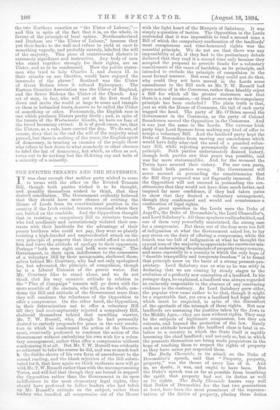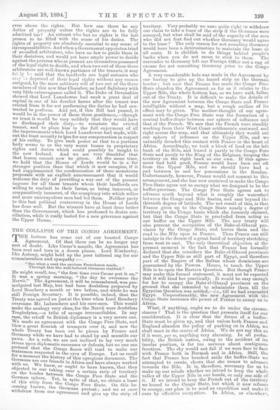THE EVICTED TENANTS AND THE STATESMEN.
IT was clear enough that neither party wished to come to terms with the other on the Evicted. Tenants Bill, though both parties wished it to be thought, and possibly themselves wished to think, that they desired conciliation. The Government evidently believed. that they should have more chance of evicting the House of Lords from its constitutional position in the country if the Irish evicted tenants remained where they are, hutted on the roadside. And the Opposition thought that in resisting a compulsory Bill to reinstate tenants who bad needlessly and ostentatiously violated their con- tracts with their landlords for the advantage of their poorer brethren who could not pay, they were so plainly resisting a high-handed and unprecedented attack on the very principle of property that they could afford to stand firm and leave the attitude of apology to their opponents. Perhaps " both were right and both were wrong." The Government, in their open indifference to the concession of a voluntary Bill by their antagonists, sheltered. them- selves behind Mr. Courtney, who had not only apologised for, but advocated, the principle of compulsion, though he is a Liberal Unionist of the purest water. But Mr. Courtney likes to stand alone, and we do not think that his very eccentric attitude in relation to the "Plan of Campaign" tenants will go down with the more sensible of the electors, who will, on the whole, con- demn the Bill and attitude of the Government more than they will condemn the reluctance of the Opposition to offer a compromise. On the other hand, the Opposition, in their determination not to offer a voluntary Bill till they had contemptuously rejected. a compulsory Bill, sheltered themselves behind that unwilling warrior, Mr. T. W. Russell, who, though he had personally desired to embody proposals for peace in the very resolu- tion in which he condemned the action of the Govern- ment, eventually preferred. to condemn the action of the Government without embodying his own wish for a volun- tary arrangement, rather than offer a compromise without, condemning it at all. But Mr. T. W. Russell was evidently sa reluctant to take the course he did, and was so much hurt b the dislike shown of his own form of amendment to the second reading, and the blank rejection of the Bill substi- tuted for it, that here again we think moderate men will go with Mr. T. W. Russell rather than with the uncompromising Tories, and will feel that though they are bound to support the Opposition rather than the Government in its open indifference to the most elementary legal rights, they should have preferred to follow leaders who had taken up Mr. Russell's attitude on the subject, rather than leaders who bundled all compromise out of the House with the light heart of the Marquis of Salisbury. It was simply a question of tactics. The Opposition in the Lords contended that it was impossible to read a second time a Bill of which the compulsory confiscation of the landlords' most conspicuous and time-honoured rights was the essential principle. We do not see that there was any impossibility at all, if they had in the preliminary debate declared that they read it a second. time only because they accepted the proposal to provide funds for a voluntary resettlement of the cases of hardship, as its principle, and intended. to exclude the principle of compulsion in the most formal manner. But even if they could not do that, why could they not have moved in the Lords some amendment to the Bill such as Mr. T. W. Russell had given notice of in the Commons, rather than blankly reject a Bill for which all the greater statesmen saw that there is a real occasion,—at least so soon as the compulsory principle has been excluded ? The plain truth is that, just as with the House of Commons, the tail of each party wagged the head. The party of Mr. O'Brien moved the Government in the Commons, as the party of Colonel Saunderson moved the Opposition in the Commons. And it was just the same in the Lords. The extreme Irish party kept Lord Spencer from making any kind of offer to accept a voluntary Bill. And the landlord party kept the Duke of Devonshire from moving any amendment which would have fully admitted the need of a guarded volun- tary Bill, while rejecting peremptorily the compulsory principle. Both parties unfortunately desired victory, though both parties saw that peace was possible, and was far more statesmanlike. And for the moment the Tories have secured their victory. For our own parts, we think both parties wrong. The Government will never succeed in persuading the constituencies that the Bill they proposed was not flagrantly immoral. But the Opposition will not succeed in persuading the con- stituencies that they would not have done much better, and inspired far more confidence, if they had taken pains to show that they desired a voluntary arrangement, though they condemned. and would not countenance a confiscation of legal rights. The great speeches in the Lords were the Duke of Argyll's, the Duke of Devonshire's, the Lord. Chancellor's, and Lord Salisbury's. All these speakers reallyadmitted, and one of them very powerfully maintained, the strong case for a compromise. But three out of the four were too full of indignation at what the Government asked for, to lay any stress on the duty of offering a compromise, while the fourth was too full of indignation at what he thought the cynical tone of the majority to appreciate the enormous mis- chief of undermining theprinciple of propertyinanycountry, and more especially in a country in which the only hope of " durable tranquillity and temperate freedom " is to found that principle anew on the basis of a strong peasant-pro- prietary. Lord Salisbury was as wise as he was witty in declaring that we are coming by steady stages to the evolution of a perfectly new conception of a landlord. In his younger days, he explained, a, landlord was always regarded. as eminently respectable in the absence of any convincing evidence to the contrary. As Lord Salisbury grew older, the popular view came rather to be that, though it might be a regrettable fact, yet even a landlord had legal rights which must be respected, in spite of the discomfort of the spectacle of the triumph of these rights. But now landlords are assuming the position taken by the Jews in the Middle Ages,—they are men without rights. They may be the subjects of legitimate compassion, but they are outcasts, and beyond. the protection of the law. Surely such an attitude towards the landlord class is fatal in re- lation to a country in which the State itself is rapidly becoming the chief landlord.; and not only so, but in which the peasants themselves are being made proprietors in the hope of teaching them to respect the rights of property as they have never yet respected them. The Daily Chronicle, in its attack on the Duke of Devonshire's speech, said that " Property, property, property," was the theme of every line of it. And so, no doubt, it was, and ought to have been. But the Duke's speech was as far as possible from breathing the spirit that property had not its duties as well as its rights. The Daily Chronicle knows very well that Dukes of Devonshire for the last two generations at least, have been the most prominent of the represen- tatives of the duties of property, placing these duties even above the rights. But how can there be any duties of property unless the rights are to be fully admitted too ? An outcast who has no rights is the last person to be filled with the sense of his duties. The rights of property are absolutely essential to any sense of itsresponsibilities. And when a Government appoints a triad of so-called arbitrators, who have no law to guide them in their decisions, and would yet have ample power to decide against the persons who at present are themselves possessed of the legal right to decide, and when two out of these three arbitrators are well-known partisans of the tenants, it may fai ly b said that the landlords are legal outcasts who may le deprived of their legal rights without any reason assigned, by the mere arbitrary will of two out of the three members of this new Star Chamber, as Lord Salisbury with very little extravagance called it. The Duke of Devonshire showed that Lord Lansdowne had sunk a great deal of capital in one of his derelict farms after the tenant was evicted from it for not performing the duties he bad con- tracted to perform. And yet, if this Bill had passed, it would be in the power of these three gentlemen,—though we trust it would be very unlikely that they would have so discharged their duty,—to reinstate the evicted tenant, and to place him in the full enjoyment of all the improvements which Lord Lansdowne had made, with- out the least security to for any compensation in respect of his outlay. To give such power as that to a partisan body seems to us the very worst lesson in proprietary rights and duties which could possibly be taught to the new Ireland. And we are very thankful that that lesson cannot now be given. At the same time, we hold that the House of Lords would be in a far stronger position than that which it now occupies, if it had supplemented the condemnation of these monstrous proposals with an explicit announcement that it would welcome the duty of providing a way out of the present impasse for all those tenants whom their landlords are willing to readmit to their farms, as being innocent, or comparatively innocent, of the conspiracy into which wilier and more unscrupulous men had led them. Neither party to this last political controversy in the House of Lords has done well. But the winners have at least done better than the Government, which has professed to desire con- ciliation, while it really lusted for a new grievance against the Upper House.



































 Previous page
Previous page